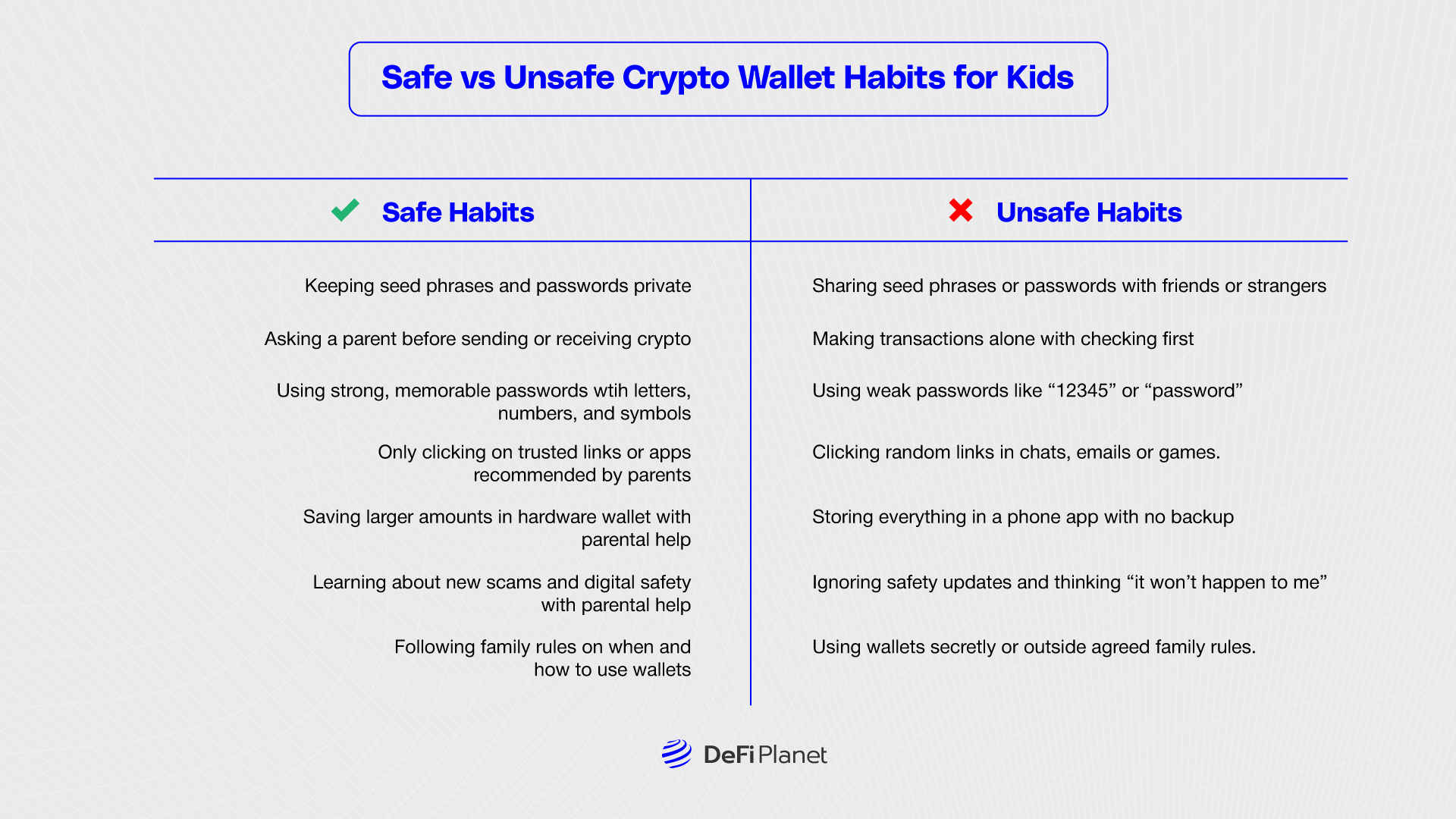The reality today is that kids are stepping into the digital world earlier than ever, and that includes crypto. Some already have their own wallets, while others are being introduced to crypto by parents who want them to start learning young. This isn’t necessarily a bad idea, but before anything else, the very first lesson kids need is crypto wallet safety.
This is because using a crypto wallet isn’t like opening a regular savings account; it comes with its own risks. In crypto, a single careless mistake, like sharing a secret phrase or clicking the wrong link, can wipe out everything in seconds.
That’s why teaching kids how to protect their wallets isn’t just about safeguarding digital pocket money. It’s about building smart online habits that will stick with them for life. Kids are naturally curious, eager to explore, and sometimes too trusting—traits that make them easy targets for scammers. But with the right crypto wallet safety tips in place, they can enjoy the fun side of crypto while staying safe and often end up more security-conscious than many adults.
So, let’s walk through these safety rules together. Once you understand them, you’ll be better prepared than most people already navigating the crypto space.
Rule #1: Never share passwords or seed phrases
This is the golden rule of crypto wallet security, and it’s the most important one to remember. Every crypto wallet has two keys that keep it safe: a password and a seed phrase.
A password works just like the password you use to unlock a game or a tablet. But the seed phrase is even more powerful; it’s a secret list of 12 to 24 random words that your wallet gives you when you set it up. Think of it as the master key to your wallet. With those words, anyone can open the wallet and take everything inside.
Here’s the big rule: Never, ever share your seed phrase. Not with friends. Not with strangers. Not with a game, an app, or even someone pretending to be “customer support.” If someone has those words, they don’t just see what’s inside; they own it.
To make it simple, parents can explain it like this:
- A seed phrase is like the key to your house. If you give that key to someone you don’t fully trust, they can walk in and take all your stuff.
- Or, it’s like the secret code to your diary. Once someone knows it, your private thoughts are no longer private.
Even grown-ups get tricked into sharing their seed phrases, and when they do, their crypto is usually gone forever. That’s why kids should learn early that passwords and seed phrases are private treasures, they’re meant to be kept safe, written down somewhere, and never typed into random websites or apps.
By making this the first habit, kids start building a strong foundation of crypto wallet safety.
Rule #2: Always ask a parent before making transactions
Clicking “send” or “confirm” inside a crypto wallet can move money in seconds, often without a chance to reverse it. For kids, this is a big responsibility. That’s why another safety rule is clear: always check with a parent before making a transaction.
Parents always help kids confirm they’re sending crypto to the right person and not falling for a trick. This habit not only prevents mistakes but also teaches kids teamwork and responsibility when handling money.
Rule #3: Use strong, memorable passwords (how to create them)
A strong password is the lock on the door to your wallet. Weak passwords like “12345” or “password” are like leaving the door wide open. Teaching kids to create strong, memorable passwords is an essential part of crypto wallet safety.
Tips for kids and parents:
- Use a mix of letters, numbers, and symbols.
- Make it long—at least 12 characters.
- Create a fun phrase only they would remember (e.g., “MyDogRuns2Fast!”).
When kids learn to create strong, memorable passwords, they’re not just protecting their crypto wallets; they’re also practicing a crucial digital skill they’ll use everywhere online.
Rule #4: Don’t click suspicious links or messages
One of the biggest threats to crypto wallet security is phishing scams (fake messages or websites designed to steal login details). Kids should be taught to pause before clicking any link they don’t recognize, especially if it comes through email, social media, or in-game chats.
The golden rule: If you didn’t expect it, don’t click it.
Parents can show kids real examples of fake messages (without clicking, of course) so they learn how to spot them. Kids should know: No real wallet, exchange, or game will ever ask for passwords or seed phrases through a message. If something feels strange, the safest move is to stop, double-check with a parent, and never click the link.
By teaching kids to pause before they click, parents can help them build a habit that protects not just their crypto wallets, but all their online activities.
Related: Common Ways People Lose Their Crypto Holdings To Scammers
Rule #5: Keep learning about digital safety as you grow
Technology changes fast. The safety rules that apply today may look different tomorrow. That’s why one of the best crypto wallet security tips for kids is to keep learning. Just like in school, digital knowledge grows step by step.
Parents should encourage kids to read guides, watch safe educational videos, and even play games that teach cybersecurity basics. The goal is to turn safety from a set of rules into a natural habit, something kids carry with them as they grow into digital citizens.
Rule #6: Use hardware wallets for larger savings
While kids might start with software wallets (apps on phones or tablets), parents should introduce the concept of hardware wallets (physical devices that store crypto offline). They are much harder for hackers to reach. For small amounts, a software wallet may be fine, but for long-term savings, hardware wallets provide stronger crypto wallet security. Explaining this helps kids understand that not all wallets are the same and that bigger savings deserve stronger protection.
Also Read: How to Use a Crypto Hardware Wallet: A Step-by-Step Guide
Rule #7: Set clear family rules for screen time and wallet use
Crypto should never become a secret side activity for kids. Parents should set boundaries: when wallets can be used, for how long, and under what conditions. This avoids impulsive behaviour and ensures crypto wallet safety stays a shared family effort.
Why Safety Matters More Than Anything
Now that we’ve gone through the rules, let’s pause and ask: Why does safety matter so much?
Unlike traditional banks, crypto doesn’t come with a customer support hotline that can magically reverse mistakes. If you lose your seed phrase or send money to the wrong address, it’s usually gone forever. That’s why crypto wallet security isn’t just another checklist; it’s the backbone of using crypto responsibly.
For kids, this matters even more because they’re still learning how to judge online risks. Scammers know this, which makes children easier targets if they aren’t prepared. By following these crypto wallet safety tips, kids not only protect their digital allowance but also learn habits that apply everywhere online, from avoiding scams in games to staying safe on social media.
In short, safety is the bridge between exploring the fun side of crypto and avoiding the dangers that come with it.
Safe vs Unsafe Crypto Wallet Habits for Kids

Conclusion: Building Lifelong Digital Responsibility
So, is crypto wallet safe for kids? The answer is yes, but only with the right rules in place. All the safety rules we have highlighted above are not just crypto wallet security tips; they’re life lessons in digital responsibility.
When kids learn these safety habits now, they carry them into their teenage years and adulthood, whether they’re managing crypto, social media, or online banking. With the right mix of parental guidance and personal responsibility, kids can navigate the digital future safely and confidently.
Disclaimer: This article is intended solely for informational purposes and should not be considered trading or investment advice. Nothing herein should be construed as financial, legal, or tax advice. Trading or investing in cryptocurrencies carries a considerable risk of financial loss. Always conduct due diligence.
If you want to read more market analyses like this one, visit DeFi Planet and follow us on Twitter, LinkedIn, Facebook, Instagram, and CoinMarketCap Community.





















